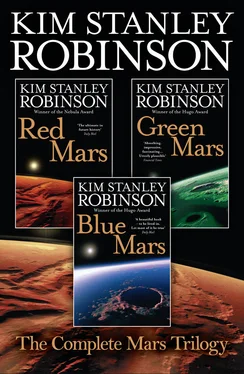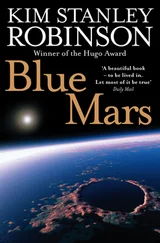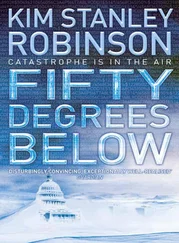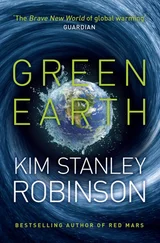“I noticed the ice cylinders were the same size as the marble drums the Greeks used for their pillars,” George said, still pleased with himself. “After that it was obvious. And the miner is running perfectly, so we had some time to kill.”
“It looks great,” Simon said. And it did: alien monument, dream visitation, it glowed like flesh in the long dusk, as if blood ran under its ice. “A temple to Ares.”
“To Neptune,” corrected George. “We don’t want to invoke Ares too often, I don’t think.”
“Especially given the crowd at base camp,” Ann said.
As they drove south their road of tracks and transponders ran ahead of them, as distinct as any highway of paved concrete. It did not take Ann to point out how much this changed the feel of their travel: they were no longer exploring untouched land, and the nature of the landscape itself was altered, split left and right by the parallel lines of cross-hatched wheel tracks, and by the green canisters slightly dimmed by a rime of dust, all marking for them “the way.” It wasn’t wilderness any more; that was the point of road-building, after all. They could leave the driving to Rover One’s automatic pilot, and often did.
So they were trundling along at 30 kph, with nothing to do but look at the bisected view, or talk, which they did infrequently, except on the morning they got into a heated discussion about Frank Chalmers – Ann maintaining that he was a complete Machiavellian, Phyllis insisting that he was no worse than anyone else in power, and Nadia, remembering her talks with him about Maya, knowing it was more complex than either of those views. But it was Ann’s lack of discretion that appalled her, and as Phyllis went on about how Frank had held them together in the last months of the voyage out, Nadia glared at Ann, trying to convey to her by looks that she was talking in the wrong crowd. Phyllis would use her indiscretions against her later on, that was obvious. But Ann was bad at seeing looks.
Then suddenly the rover braked and slowed to a stop. No one had been watching, and they all jumped to the front window.
There before them was a flat white sheet, covering their road for nearly a hundred meters. “What is it?” George cried.
“Our permafrost pump,” Nadia said, pointing. “It must have broken.”
“Or worked too well!” Simon said. “That’s water ice!”
They switched the rover to manual, drove nearer. The spill covered the road like a wash of white lava. They struggled into their walkers and got out of the module, walked over to the edge of the spill.
“Our own ice rink,” Nadia said, and went to the pump. She unhooked the insulation pad and had a look inside. “Ah ha – a gap in the insulation – water froze right here, and jammed the stopcock in the open position. A good head of pressure, I’d say. Ran till it froze thick enough to stop it. A tap from a hammer might get us our own little geyser.”
She went to her tool cabinet in the underside of the module, took out a pick. “Watch out!” She struck a single blow at the white mass of ice, where the pump joined the tank feeder pipe. A thick bolt of water squirted a meter into the air.
“Wow!”
It splashed down onto the white sheet of ice, steaming even though it froze within seconds, making a white lobate leaf on top of the ice already there.
“Look at that!”
The hole too froze over, and the stream of water stopped, and the steam blew away.
“Look how fast it froze!”
“Looks just like those splosh craters,” Nadia remarked, grinning. It had been a beautiful sight, water spilling out and steaming like mad as it froze.
Nadia chipped away at the ice around the stopvalve; Ann and Phyllis argued about migration of permafrost, quantities of water at this latitude, etc. etc. One would think they’d get sick of it. But they really did dislike each other, and so they were helpless to stop. It would be the last trip they ever took together, no doubt about it. Nadia herself would be disinclined to travel with Phyllis and George and Edvard anymore, they were too complacent, too much a little in-group of their own. But Ann was alienated from quite a few other people as well; if she didn’t watch out, she’d be without anyone at all to accompany her on trips. Frank, for instance – that comment to him the other night, and then telling Phyllis of all people how horrible he was; incredible.
And if she alienated everyone but Simon, she would be hurting for conversation; for Simon Frazier was the quietest man in the whole hundred. He had hardly said twenty sentences the entire length of the trip, it was uncanny, like traveling with a deaf-mute. Except maybe he talked to Ann when they were alone, who knew?
Nadia worked the valve into its stop position, then shut the whole pump down. “We’ll have to use thicker insulation this far north,” she said to no one in particular as she took her tools back to the rover. She was tired of all the sniping, anxious to get back to base camp and her work. She wanted to talk with Arkady; he would make her laugh. And without trying, or even knowing exactly how, she would make him laugh too.
They put a few chunks of the ice spill in among the rest of the samples, and set out four transponders to guide robot pilots around the spill. “Although it may sublime away, right?” Nadia said.
Ann, lost in thought, didn’t hear the question. “There’s a lot of water up here,” she muttered to herself, sounding worried.
“You’re damned right there is,” Phyllis exclaimed. “Now why don’t we have a look at those deposits we’ve spotted at the north end of Mareotis?”
As they got closer to base Ann became more close-mouthed and solitary, her face held tight as a mask. “What’s the matter?” Nadia asked one evening, when they were out together near sunset, fixing a defective transponder.
“I don’t want to go back,” Ann said. She was kneeling by an isolated rock, chipping at it. “I don’t want this trip to end. I’d like to keep traveling all the time, down into the canyons, up to the volcano rims, into the chaos and the mountains around Hellas. I don’t ever want to stop.”
She sighed. “But … I’m part of the team. So I have to climb back into the hovel with everyone else.”
“Is it really that bad?” Nadia said, thinking of her beautiful barrel vaults, of the steaming whirlpool bath and a glass of icy vodka.
“You know it is! Twenty-four and a half hours a day underground in those little rooms, with Maya and Frank running their political schemes, and Arkady and Phyllis fighting over everything, which I understand now, believe me – and George complaining and John floating in a fog and Hiroko obsessed by her little empire – Vlad too, Sax too … I mean, what a crowd!”
“They’re no worse than any other. No worse and no better. You have to get along. You couldn’t be here all by yourself.”
“No. But it feels like I’m not here anyway, when I’m at the base. Might as well be back on the ship!”
“No, no,” Nadia said. “You’re forgetting.” She kicked the rock Ann was working on, and Ann looked up in surprise. “You can kick rocks, see? We’re here, Ann. Here on Mars, standing on it. And every day you can go out and run around. And you’ll be taking as many trips as anyone, with your position.”
Ann looked away. “It just doesn’t seem like enough, sometimes.”
Nadia stared at her. “Well, Ann: it’s radiation keeping us underground more than anything. What you’re saying in effect is that you want the radiation to go away. Which means thickening the atmosphere, which means terraforming.”
“I know.” Her voice was tight, so tight that suddenly the careful matter-of-fact tone was lost and forgotten: “Don’t you think I know?” She stood and waved the hammer. “But it isn’t right! I mean I look at this land and, and I love it. I want to be out on it traveling over it always, to study it and live on it and learn it. But when I do that, I change it – I destroy what it is, what I love in it. This road we made, it hurts me to see it! And base camp is like an open pit mine, in the middle of a desert never touched since time began. So ugly, so … I don’t want to do that to all of Mars, Nadia, I don’t. I’d rather die. Let the planet be, leave it wilderness and let radiation do what it will. It’s only a statistical matter anyway, I mean if it raises my chance of cancer to one in ten, then nine times out of ten I’m all right!”
Читать дальше












